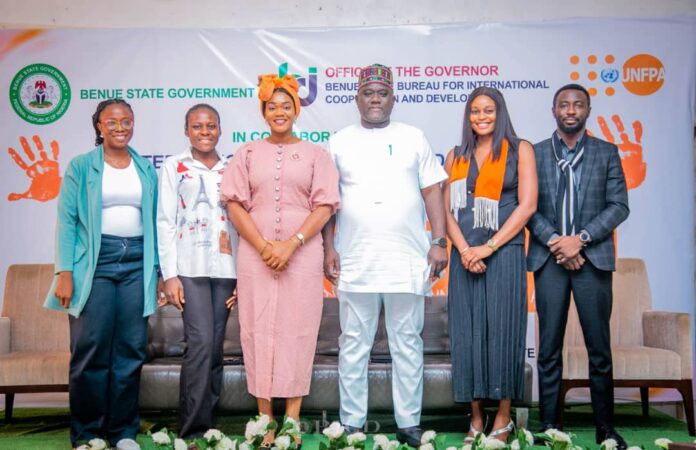From Msurshima Andrew, Makurdi
In a bis to address Gender-Based Violence (GBV), the Benue State Government, through its Bureau for International Cooperation and Development (BICD), has partnered with the United Nations Population Fund (UNFPA) to convene a strategic parley with the 23 Local Government Area Chairmen of the state.
The initiative, themed “Towards Beijing +30: Unite to End Violence Against Women and Girls,” is part of the 16 Days of Activism aimed at fostering awareness and action against GBV, with a specific focus on grassroots impact.
At the event, the state Governor, Rev. Fr. Hyacinth Alia reaffirmed his administration’s unwavering commitment to eradicating GBV through comprehensive legal frameworks, partnerships with NGOs, and survivor-focused support services.
Alia said the efforts were vital to creating a safer and more equitable society in Benue State.
Addressing participants, the Director General BICD, Leo-Angelo Viashima, emphasized the significance of the state’s collaboration with UNFPA during this period of activism.
He reiterated the government’s commitment to standing with survivors and putting robust frameworks in place to ensure that GBV is addressed decisively.
Viashima also stressed that the event served as a warning to perpetrators, stating that the law would not tolerate such behaviours in the state.
The engagement focused on equipping local government leaders and their spouses with the tools to combat GBV effectively in their respective communities. The initiative seeks to create a unified 23-stage platform that would strengthen advocacy and ensure that critical conversations about GBV permeate every level of governance.
Participants, including Local Government Chairmen, their spouses, and other stakeholders, committed to driving the campaign against GBV into their respective communities.
Speaking, the state ALGON Chairman, Maurice Orwough, announced plans for each local government to establish an NGO that would function as a GBV response center, with the active involvement of their wives.
He emphasized the importance of working closely with civil society organizations (CSOs) and traditional institutions to ensure advocacy efforts yield measurable results.
The discussions also highlighted the need for long-term solutions, including the establishment of gender desks in local government offices, equipped with professionals to address GBV cases. Stakeholders identified drug abuse and insecurity as major contributors to GBV and stressed the importance of widespread sensitization and awareness campaigns.
Representing UNFPA, Sexual and Reproductive Health Analyst Dr. Hamira Welye called for capacity building among all stakeholders to ensure they are well-equipped to fight GBV. She also emphasized the importance of collaboration in achieving sustainable results.
The event featured panel discussions led by experts from various sectors, including local government officials, CSOs, and UN representatives.
The conversations centered on implementing the Violence Against Persons Prohibition (VAPP) Act and setting up practical mechanisms to ensure its success. Commitments were made to prioritize leadership at the local government level as a means to drive development and tackle GBV comprehensively.
Wives of the Local Government Chairmen, led by the wife of ALGON Chairman Maurice Orwough, pledged to sustain the campaign and initiate community-driven programs to combat GBV. They committed to fostering meaningful action within their respective communities to achieve measurable outcomes.
The event attracted significant participation from organizations and dignitaries, including representatives from UNHCR, WHO, UNDP, and CSOs. Their contributions underscored the importance of multi-sectoral collaboration in addressing GBV and fostering a culture of accountability and support for survivors.
This partnership demonstrates that through meaningful collaboration and grassroots engagement, tangible progress can be made in the fight against GBV. The efforts in Benue State provide a model for other regions seeking to address GBV, showing that sustainable change is possible when communities, governments, and international organizations work together.






